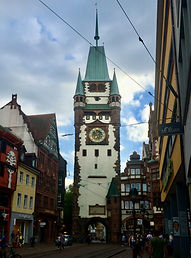Pisa-Freiburg
school in Applied Analysis


P
I
S
A
F
R
E
I
B
U
R
G
Abstracts
Sören Bartels
Title: Error estimates for the approximation of nonsmooth problems
Abstract: Various modern applications including mathematical image processing and fracture modeling require the use of nondifferentiable functionals. Their numerical solution by standard finite element methods leads to suboptimal convergence rates. The talk discusses the use of nonconforming and discontinuous finite element methods and provides quasioptimal error estimates. These are obtained by using appropriate discrete convex duality relations and identifying suitable regularity conditions. The techniques apply to a large class of convex minimization problems and lead to a postprocessing formula that provides the solution of the discrete dual problem via the nonconforming solution of the discrete primal problem. The approximations give rise to the definition of a primal-dual gap error estimator. Using the particular structure of the discrete dual variable we identify a monotonicity formula that allows us to establish efficiency properties of the estimator for a class of nonlinear Dirichlet problems.
The short course is organized in three lectures and a lab tutorial which address the following topics:
L1: Convex duality and nonstandard finite element methods
L2: Discrete convex duality and reconstruction formula
L3: A priori and a posteriori error estimates
LT: Implementation of finite element methods (in Matlab/Octave)
Giuseppe Buttazzo
Title: Optimization problems for elliptic PDEs
Abstract: The goal is to present optimization problems related to elliptic PDEs with Dirichlet boundary conditions. More precisely, the goal is to consider the problems:
L1. PDE $-div(a(x)∇u)=f where we look for the optimal coefficient a in suitable classes;
L2. PDE -∆u+V(x)u=f where we look for the optimal potential V in suitable classes;
L3. PDE -∆u=f where we look for the optimal right-hand side f in suitable classes;
L4. PDE -∆u=f where we look for the optimal domain Ω in suitable classes.
Existence of optimal solutions will be discussed, together with some properties of them. In the last lecture some young researchers will present some results on related questions.
L4 will consist of three talks by Ilaria Lucardesi, Davide Carazzato, Roberto Ognibene
Davide Carazzato: "Characterization of the maximizers for a Wasserstein energy"
Abstract. We study an energy defined through an optimal transport problem, which previously appeared in some models representing biological membranes. We prove that the maximizers coincide with a ball in many relevant cases, and this is done by means of a symmetrization technique. This talk is based on a joint work with Almut Burchard and Ihsan Topaloglu.
Ilaria Lucardesi: "Shape optimization under width constraint"
Abstract. Among the geometric constraints considered in shape optimization, the classical ones are surely the perimeter and the volume. For example, the literature on minimizing the eigenvalues of the Laplacian under one of these constraints spans more than a century of Mathematics. Less common, but equally significant, are the constraints of maximal width (the diameter) and minimal width, which describe how 'large' and 'small' an admissible set can be, respectively. The shape optimization of monotone functionals (with respect to inclusion) under maximal/minimal width constraint naturally leads to the consideration of two classes of shapes: the bodies of constant width and the reduced bodies. The classical literature on shape optimization in these familes of sets focuses on functionals of purely geometric type. The coupling with functionals of spectral type is a new research field and has many open questions. In this seminar, I will present some recent results and ongoing projects in this direction. The talk is based on joint works with Antoine Henrot (Nancy, France) and Davide Zucco (Turin, Italy).
Roberto Ognibene: "On the stability of Robin eigenvalues"
Abstract. In this talk, I will discuss the asymptotic behavior of the eigenvalues of the Laplacian with Robin boundary conditions, with respect to the Robin parameter. In particular, I will focus on two main cases: when the parameter goes to zero (convergence to Neumann eigenvalues) or to infinity (convergence to Dirichlet eigenvalues).
Cyrill Muratov
Title: Multiphase materials: phase coexistence, segregation and the emergence of microstructure
Abstract: This mini-course will serve as an introduction to the phase field models of phase transitions and phase coexistence and will attempt to cover the following subjects:
L1: Introduction to models of phase transitions: van der Waals theory, Landau theory, lattice gas, Cahn-Hilliard and Allen-Cahn equations
L2: Spinodal decomposition and continuous ordering, nucleation and growth, coarsening
L3: Optimal bounds on coarsening rates
L4: Competition of short-range and long-range interactions and formation of microstructure
Alessandra Pluda
Title: Geometric flows and applications
Abstract: The aim of the course is to introduce some intrinsic geometric flow and describe their applications in different contexts.
L1: Mean Curvature Flow: from the area functional to the PDE system
L2: Curve-shortening flow: a complete analysis
L3: Network flow and grain boundaries
L4: Inverse Mean Curvature flow and the Riemannian Penrose Inequality
L4 will be given by Luca Benatti

